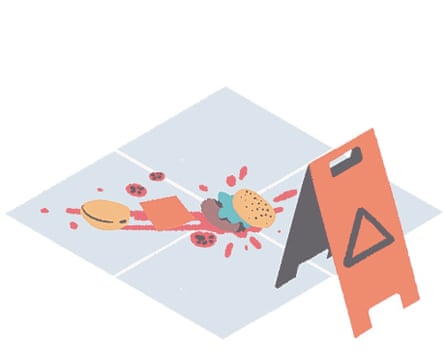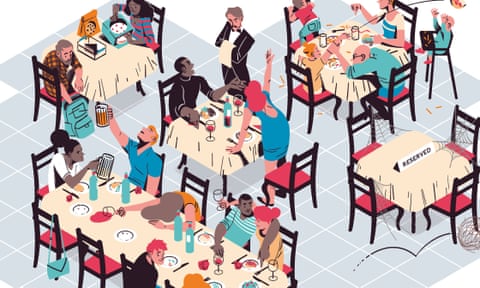The modern British restaurant scene is more casual and popular than ever before. Formal etiquette is, thankfully, history. But in this newly democratic realm there are still ways we can behave for the good not just of our fellow diners, but also restaurant staff and the venues we love. In the past few months, I’ve noticed chefs on social media making pleas for drunk patrons not to grope staff, and taking rude customers to task. So, to prevent that kind of thing and more from happening, here are the new rules of dining.
No-show no-no
With restaurants facing their toughest trading conditions since 2008, no-show bookings that leave tables empty is a hot topic. “We’d easily get eight in a 60-cover service at Sticky Walnut [in Chester] and that can absolutely be the difference between making money and not,” says owner Gary Usher. Staff would phone absent customers who, if they picked up at all, would be rude or blase.
OpenTable suspends user accounts after four no-shows in 12 months. But unless you are a swine who books several tables across town and idly chooses one at the last minute, it should never come to that.
If you need to cancel, simply let the restaurant know as early as possible, so it can refill that table. Accept also that, increasingly, restaurants will demand your credit card details when booking and charge you if you no-show without explanation. It is not personal. It is survival. Usher’s restaurant now holds card details to secure bookings during popular services: “I was nervous. We’re not a destination. But it’s a deterrent. The no-shows stopped immediately.”
Dietary requirements
You may see mouthy chefs on social media moaning about vegans, but many modern restaurants will accommodate not just allergies, but a spectrum of ethical, medical and lifestyle dietary requirements – biting their tongues where necessary. “Avoiding gluten through dinner then treating yourself to a brownie happens a lot. It drives chefs to distraction but it shouldn’t matter. Many people consider it acceptable,” says Ben Wright, co-owner of the north-west’s Joseph Benjamin and Porta restaurants. “We do everything we can. We recently had someone in with a white-food-only diet.”
But the onus is on diners to communicate their requests early and clearly when booking. Chefs cannot rework dishes mid-service. “We’re not mind-readers,” says Vicky Roberts, manager at York’s Le Cochon Aveugle. “We serve a blind tasting menu so we’re hot on checking dietary requirements. It’s amazing how many ‘vegetarians’ eat chicken and fish.”
Group booking
When tasked with a group-booking, play nice. Do not book somewhere inconsiderately pricey (real friends discuss a ballpark spend-per-head beforehand), at a contentious time slot or as part of some passive-aggressive power play. This is not an opportunity to challenge your parents’ provincial tastes. Being a finicky foodie does not give you licence to drag noncommittal friends to that new Szechuan offal place. Ultimately, friendship should trump food quality. Be considerate: compromise.
Queue here
Most points of conflict (queue jumping, people placeholding for five mates etc) have melted away. The voguish London restaurants that attract them – Kiln, Pastaio, Hoppers – now generally use virtual waiting lists and text callbacks to manage their queues, so you can wait in a pub not in the rain. Yet in this fast-casual sphere, diners need to learn to vacate tables promptly. Is there any greater frustration than being kettled in a tiny bar/holding pen as you wait for a table, watching people take an eternity to finish their drinks, get their coats on and leave? Sling yer hook.
Communal living
From street food markets to hip cafes, we increasingly find ourselves sharing – or begrudgingly, not – communal tables. This horrific trend necessitates some basic rules. Do not spread your bags, coats and laptops everywhere. Sit in a way that uses space efficiently. Do not claim seats for people who are not there yet. This is first come, first served, fast-turnover seating. Pass the time and the salt, be civil, but do not pursue conversation. People are here to enjoy their precious free time, not (ye gods!) make pottering small-talk with strangers.
Child care
In restaurants, children should be seated and not heard. Break out the tablets (electronic ones, not tranquilisers). Staff and other diners are not obliged to entertain, indulge or corral your children back to the table. In adult restaurants, do not get huffy because the kitchen declines to make child-friendly tweaks to dishes/add chips/nip out to Tesco for a pizza. Want to prioritise your kids? Take them somewhere family-friendly.
Staff relations
The base level of dining competency is, obviously, to treat waiting staff like equals who are providing a professional service. Say please, say thank you. Accept interruptions gracefully. Ask questions about the food, but do not quiz staff about their accents, background, hair, tattoos, personal life or anything else that might make them feel uncomfortable. Do not make dumb jokes at their expense.
At its most rewarding this is a joint performance. Smile, even if you don’t feel like it. Do not project your bad mood. Pretend, as waiters have to. Tip: if you really want to enjoy that expensive tasting menu, engage in the rhythm of service and stop taking toilet/fag breaks just as the next course arrives.
Addendum: don’t touch the staff
In 2018, you might assume it is a given that customers must not pet, grope or manhandle waiters. But having browsed Twitter and seen chefs such as Stevie Parle reminding diners to “Keep your hands to yourself” – and Guinea Grill landlord Oisin Rogers proudly relaying his team’s zero tolerance approach: “She told him she would cut his arm off if he touched her again” – it needs reiterating: DO NOT TOUCH THE STAFF.

Sharing and sharing alike
“Small plates designed for sharing,” reads the menu, often erroneously (try splitting three croquetas between four or evenly dividing a burrata salad). Plus, who wants to only get a few forkfuls of the dish they really fancied? No. To guarantee small-plate satisfaction, we need rules. Namely that everyone gets a first pick of at least one dish – to eat or share as they see fit – then a further two loosely negotiated sharing dishes “for the table”.
Quiet zone
Phones in restaurants? A non-issue. Egotistical chefs dislike diners photographing dishes (they crave reverent diners and loathe blurry online shots of their work), but other guests? Unconcerned. Even people preening for at-table selfies is more ludicrous than intrusive. In 2018 does anyone really take offence at someone briefly texting, tweeting or answering an email at lunch? No.
Gastrospods
Are you droning on about the provenance of the heritage tomatoes again? Is everyone glazing-over? Please desist, foodies. You chose a good restaurant. Well done. Now where is that wine waiter?
Cakeage
Restaurants exist to sell you things, like dessert. If you want to bring your own birthday cake to eat, you cannot moan about “cakeage” (corkage charge for cakes). As an alternative, the Sticky Walnut staff will present your cake so you can blow the candles out, but you cannot eat it. “People would bring Sainsbury’s frangipane tarts in. I make frangipane tart. And birthday cakes. Why would I let you eat that here?” asks Gary Usher.
Not so private party
Cakeage arises because large parties (balloons, party poppers, top-volume bantz with other tables) have a tendency to treat restaurants like home. If you want to take over, book a private dining room. Otherwise, consider the comfort of fellow diners. “I had to ask one group to leave when their excess noise deteriorated to singing Another One Bites the Dust and clapping-out traumatised neighbouring diners,” says Ben Wright.
Complaints procedure
The British are notoriously bad at complaining face-to-face (hence the rise of the cowardly keyboard warrior). We do not complain often and when we do we can really lose it. “Nervous people don’t always become shy; some get blunt and aggressive,” says Wright. We need to learn how to complain confidently.
Rather than emailing later (“Emails are easily misinterpreted,” says Roberts), complain in person and promptly. “I’ve shouted ‘thief!’ down the street at a woman who refused to pay for the soup that she ate every spoonful of, but ‘didn’t like’,” says Wright. Where possible, stick to objective facts: this dish is salty/burned/cold. Not liking something is opinion. Likewise, arguing a dish is inauthentic could run and run. Pulling out the pompous but-I-holiday-in-Sicily-every-year card proves nothing.
Keep calm, be clear and do not demand a freebie. Restaurateurs want to resolve issues and make sure you leave happy, but they have procedures. Transparent blagging rankles. Wright: “Freebie-hunters are rarer in indie places but staff in chains robotically apologise and give away free stuff, perpetuating the issue.” As for threatening a restaurant with a one-star TripAdvisor review, don’t. At best, it sounds petty and self-important, at worst like blackmail.
Tipping point
After recent scandals about restaurants deducting charges from card tips, diners began to ask if staff would prefer cash. Laudable. Until you discover that, for example, some waiters are disingenuously asking for their 10-20% in cash in order to avoid pooling it – despite that being the (arguably, fairer) system that the staff voted for. “I’ve given up asking,” says exasperated Restaurant magazine editor, Stefan Chomka. “I always tip cash explicitly for the person serving me but if it’s shared out, fine. I don’t want to start trying to understand the machinations of a business every time I eat out.” Tip generously in cash, but the sooner others follow Camber’s Gallivant hotel (prices and wages raised, all staff are on above Living Wage Foundation rates, tips are discouraged), the better.
Paying up
Splitting the bill evenly is the only way to pay without rancour or tediously itemising every drink and side. Occasionally you will pay more, but it evens out over time. Happily swallowing that discrepancy confirms to friends and family that, actually, their companionship is of greater value to you than what you ate. If it is not (if you are skint, on a diet, teetotal and resent subsidising your boozy mates etc), decline the invitation. Better that than everyone else dreading the moment when you start quibbling sourly about the bill. There are exceptions: perhaps there’s a designated driver at the table and you have all hammered the wine. Someone has brought four kids along and you only have one. But, even then, any discount should be offered by the drinkers or parents. Demanding it strikes a jarring, selfish tone. Above all, do not ask the staff to split the bill for you. They are busy. Use the calculator on your phone. Pay up, tip well. Goodnight.
